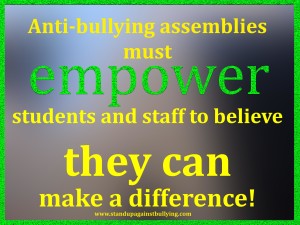Another anti-bullying assembly? Are kids raising their eyebrows? After these assemblies, does bullying seem to increase?
Have you heard the above statements about anti-bullying assemblies? Are you one of the people who believes they have no value?
Actually, they can have incredible value if done right. They must present the information in the right way. Not a good idea to lecture students or have the assembly sound like a threat to the students.
It is important to include an element of fun and light heartedness and also get the point across that bullying is serious and will not be tolerated.
Kids might raise their eyebrows because some of those very kids are doing some of the bullying and may feel uncomfortable in a situation where everyone is being made aware that bullying is wrong and won’t be accepted.
They may raise their eyebrows because they have heard so much of this before. Actually these are all good reasons to keep working on bullying awareness and keep the message at the forefront that bullying will not be accepted here.
If they raise their eyebrows – so what? That is not necessarily a bad thing.
Bullying often does increase after an anti-bullying assembly or at least it may appear to. Everyone comes out of that assembly thinking about  what bullying is and what it is not. The awareness level is high at that time. Many of the kids will start thinking much more about their own situations and whether they are bullying someone or whether someone is bullying them. Therefore it only makes sense that after an anti-bullying assembly, it may seem like there is more bullying. The awareness has increased. That is what we want. Anti-bullying assemblies are partly designed to increase awareness.
what bullying is and what it is not. The awareness level is high at that time. Many of the kids will start thinking much more about their own situations and whether they are bullying someone or whether someone is bullying them. Therefore it only makes sense that after an anti-bullying assembly, it may seem like there is more bullying. The awareness has increased. That is what we want. Anti-bullying assemblies are partly designed to increase awareness.
Effective anti-bullying assemblies will help kids understand that they do not want bullying in their school and therefore they will be a part of the action in order to stop it. After all, the best way to get people to do something, is to help them understand what they actually want and empower them. Most students and staff in schools would prefer that bullying did not exist. However, many do not feel empowered to help reduce bullying. That’s where the anti-bullying assembly comes in – to empower students and staff to believe they can make a difference.
I will repeat that because it is so important:
Anti-bullying assemblies must empower students and staff to believe they can make a difference!
The most effective way to reduce bullying is to increase respect. The less talk about bullying the better it is. The more we can talk about the behaviours we want and value, the better it is. Talk about inclusion, being friends, sharing, helping others and working together in a cooperative, fun environment.
Anti-bullying assemblies do work if they are done right. Be prepared to plan an excellent assembly, or bring in someone who has the experience and expertise already. The effort will be well worthwhile.
Bruce Langford has presented anti-bullying assemblies to over 145,000 students in schools over the past 10 years. www.standupnow.ca

